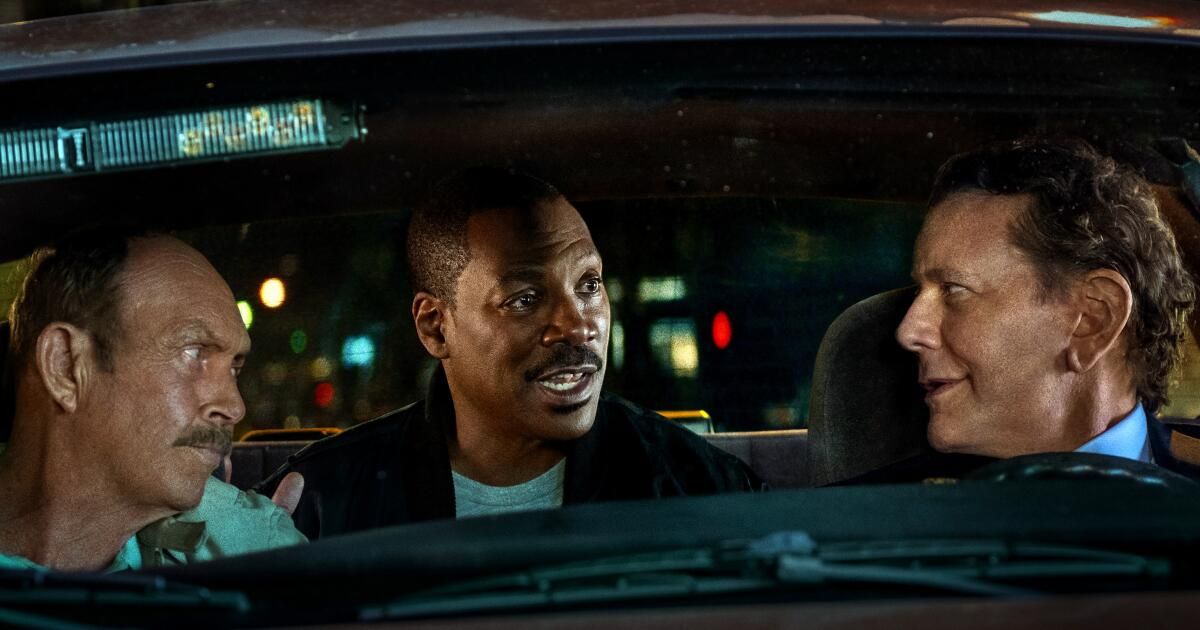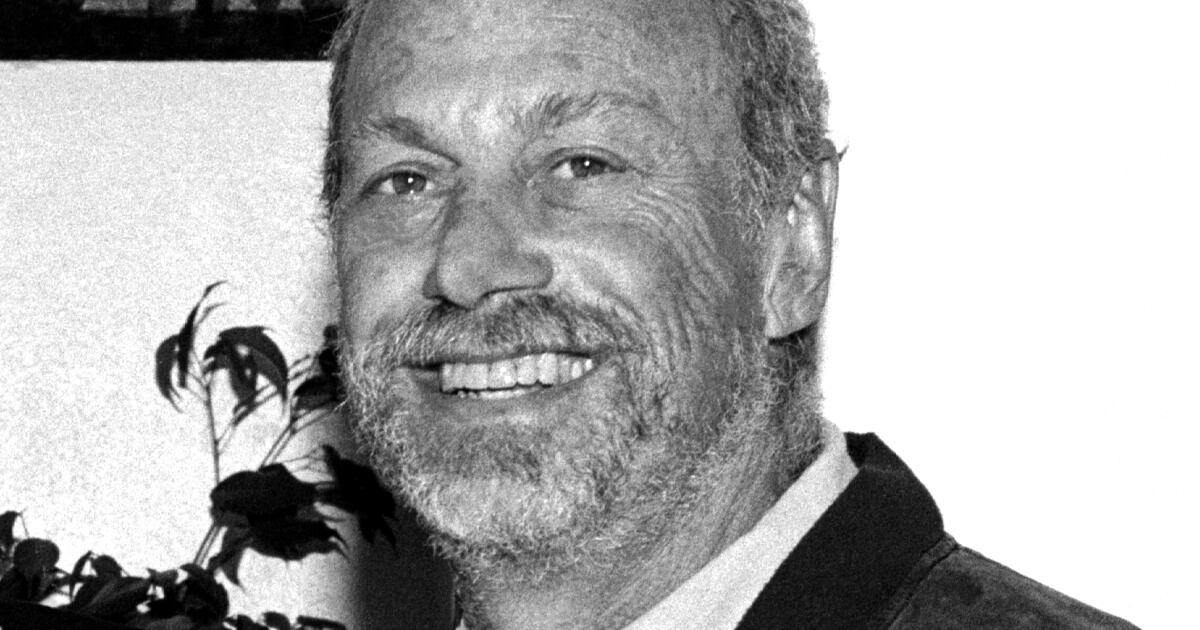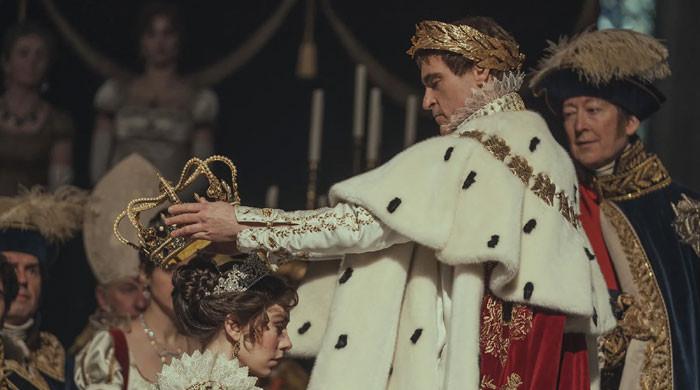How to make a new “Beverly Hills Cop” movie? It’s a question that has long plagued Hollywood. Brett Ratner tried for years to solve the case, though judging by an interview with Empire magazine in 2010, it’s fair to wonder how far he got. “Where do we start?” he asked.
Where, indeed? Among the obstacles that have puzzled those who have tried to revive the franchise are: Is Axel retired? Is he in Beverly Hills? Is he on vacation? Will Judge Reinhold reprise his role as Billy Rosewood?
In retrospect, this all seems unnecessarily complicated. From the moment the Don Simpson/Jerry Bruckheimer Films lightning bolt logo appears on screen in Netflix’s “Beverly Hills Cop: Axel F” (premiering July 3), followed by the sax riff of “The Heat Is On,” you realize that everyone involved understood the task. The solution to creating a new “Beverly Hills Cop” movie was simply to make the first one from scratch.
“Beverly Hills Cop” was released 40 years ago, an anniversary that will alarm the segment of moviegoers who remember seeing it in theaters, and perhaps astonish some who now realize Murphy was just 23 when he made it. The film topped the box office for 13 consecutive weeks, sold 67 million tickets and, adjusted for inflation, remains the highest-grossing R-rated film of all time. Following his work on “Saturday Night Live,” “48 Hrs.” and “Trading Places,” it certified Murphy as a movie star.
Eddie Murphy and Taylour Paige in the movie “Beverly Hills Cop: Axel F.”
(Melinda Sue Gordon / Netflix)
You had to be there. And if you weren’t (but especially if you were), “Beverly Hills Cop: Axel F” has been designed to function as a carefully calibrated time machine to take you back to the days when synth pop ruled the airwaves, you could disable a car by putting a banana in the tailpipe, and a suite at a posh Beverly Hills hotel cost $235 a night. (The price, we learn in “Axel F,” has gone up considerably.)
The formula for making a “Beverly Hills Cop” movie is this: You start in Detroit, Axel’s hometown, and spend a good deal of time and money on a chase involving cars and trucks and, in the case of “Axel F,” a snowplow. Axel operates outside the police rules, and when this opening scene is over, after much mayhem and destruction, his screaming boss lets him know that he’s gone too far this time and that he better never do anything like that again (this time it’s Paul Reiser who reads him the riot act).
But the rebuke is pointless because Axel was right. He's always right. In fact, he's never more right than when everyone is telling him he's wrong. That's part of the character's appeal.
Then something happens that forces a trip to Los Angeles — 90210, to be exact. In “Axel F,” it’s a call from Billy Rosewood (Judge Reinhold), still lovable and now in danger because he’s about to uncover the truth about a police cover-up. And Billy’s not the only one in danger. Axel’s estranged daughter, Jane (Taylour Paige), is also tangled up in the mess, thanks to her job as a criminal defense attorney.
With his course set, Axel heads to Beverly Hills, where he cleverly talks his way out of trouble, shares scenes with the heavily accented Serge (Bronson Pinchot), teaches the local authorities a thing or two about police work and occasionally demonstrates a canny understanding of American race relations. (When a police officer tells him not to look for his ID in “Axel F,” Axel replies, “I’ve been a cop for 30 years. I’ve been black a lot longer. Trust me. I know better.”)
Then there's a final showdown, featuring the need to remove sunglasses while operating a machine gun, some more movement to the tune of Harold Faltermeyer's synth-pop song “Axel F,” the equivalent of a group hug between Murphy, Reinhold, and John Ashton (returning as Detective Taggart, Billy's partner and cranky best friend), and the credits roll.
You may not remember, but the first “Beverly Hills Cop” movie received an Oscar nomination for original screenplay. Did voters know that Murphy improvised most of his dialogue to the point that his co-stars couldn’t help but break down? Maybe this was a nod. Murphy was just that good.
You may also not know that there was a third “Beverly Hills Cop” movie, the 1994 one, which Murphy has called “garbage.” One of the best lines in “Axel F” comes when Joseph Gordon-Levitt, a franchise newcomer who plays a Beverly Hills police detective, flips through Axel’s file and says, “And then, 1994. Not your finest hour.” The first two films, along with “Axel F,” are available to watch on Netflix. The third is not.
To promote “Axel F,” director Mark Molloy is touting the fact that he gave Murphy free rein to improvise. (Three writers — Will Beall, Tom Gormican and Kevin Etten — share screenplay credit. Kudos to whoever came up with the phrase “not your finest hour.”) Murphy is effective, even if the tone has shifted from unabashed braggadocio to wistful glee. The warmth is gone.
But you already knew that. Murphy is content to act his age, and the movie spends much of its time focusing on Axel's attempts to reconnect with his daughter, a woman as headstrong as her father. And it's hard to validate feelings when they're drowned out by machine gun fire.
While it’s easy to see “Axel F” as a calculated money-making scheme, it’s clear that Murphy has affection for the title character. From the beginning, Murphy’s performance hinged on Axel’s ability to connect warmly with everyone he meets. Even the villains like him. As Axel drives his blue Chevy Nova through the streets of Detroit during the new film’s opening credits, the city’s residents smile and wave (and sometimes give him the middle finger) as he passes by. They’re happy to see him. And so are we.
'A detective on the loose in Hollywood: Axel F.'
Classification: R, for constant language, violence and brief drug use.
Execution time: 1 hour, 55 minutes
Playing: Streaming on Netflix July 3












